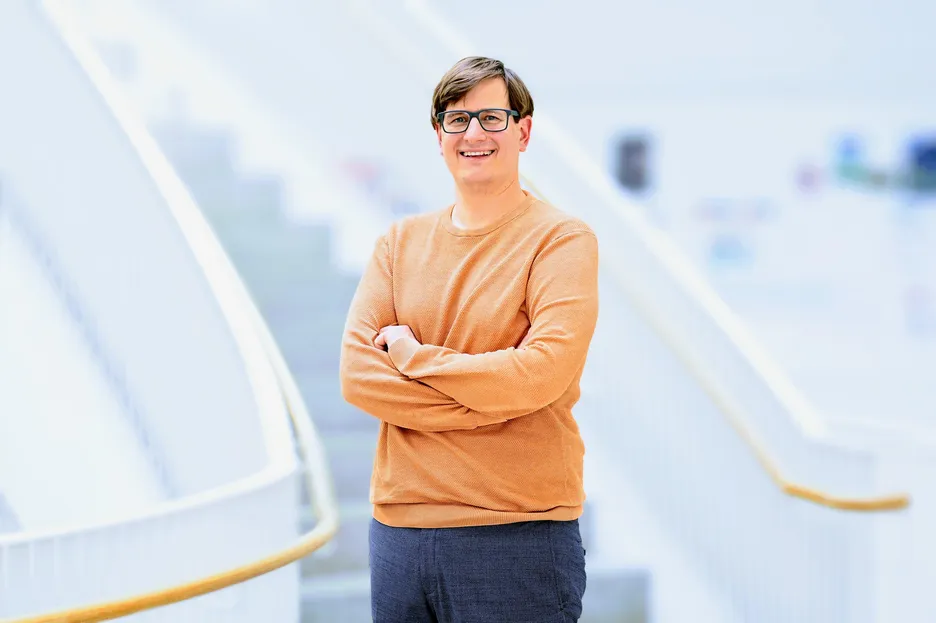This content is only available in English
Benedikt Wiestler - AI for Image-Guided Diagnosis and Therapy

Research Focus
While medical imaging generates vast amounts of information, only a fraction is currently used to inform clinical decisions. Our lab, "AI for Image-Guided Diagnosis and Therapy," aims to bridge this gap by developing innovative image analysis methods to extract actionable (imaging) biomarkers and thus make this wealth of data accessible and actionable for clinicians. This interdisciplinary approach bridges medicine and computer science, ultimately contributing to personalized medicine for diagnosis and therapy.
Publications like [1] and [2] highlight this interdisciplinary focus, showcasing our collaboration with computer science groups to advance medical image analysis techniques and biophysical models.
Translating these advancements into clinical applications is a core motivation for our work. For example, in [3], we use computational image analysis to improve the assessment of inflammatory disease activity in Multiple Sclerosis patients. Similarly, [4] demonstrates how we leverage Deep Learning models to inform personalized radiotherapy planning.
Beyond research, we actively contribute to the medical image analysis community by participating in and organizing key challenges and workshops, such as the Brain Tumor Segmentation (BraTS) or Ischemic Stroke Lesion Segmentation (ISLES) challenges [5].
Prof. Wiestler studied medicine at the Universities of Bonn and Heidelberg. In 2011, he received his doctorate from the University of Heidelberg on molecular mechanisms of glioma invasion and then conducted postdoctoral research at the German Cancer Research Center in Heidelberg. In 2018, he habilitated at the TUM and in 2020 became a senior physician at the Institute for Diagnostic and Interventional Neuroradiology. In 2024, he was appointed to the professorship "AI for Image-Guided Diagnosis and Therapy" at TUM.
- Best project presentation “Image Quality Transfer in MRI with Deep Neural Networks”, Medical Image Computing Summer School, University College London (2020)
- Kurt Decker Award, German Society of Neuroradiology (2019)
- 2nd Place “Lecturer of the Year”, Faculty of Medicine, TUM (2018)
- Fellowship of the German National Merit Foundation (2005 – 2009)
[1] McGinnis J, Shit S, Li H, Sideri-Lampretsa V, Graf R, Dannecker M, Pan J, Stolt-Anso N, Mühlau M, Kirschke J, Rueckert D, Wiestler B. Single-subject Multi-contrast MRI Super-resolution via Implicit Neural Representations. MICCAI, 2023
[2] Ezhov I, Scibilia K, Franitza K, Steinbauer F, Shit S, Zimmer L, Lipkova J, Kofler F, Paetzold JC, Canalini L, Waldmannstetter D, Menten MJ, Metz M, Wiestler B*, Menze B* (equal contribution). Learn-Morph-Infer: A new way of solving the inverse problem for brain tumor modeling. Medical Image Analysis 2023 Jan;83:102672
[3] Eichinger P, Schön S, Pongratz V, Wiestler H, Zhang H, Bussas M, Hoshi MM, Kirschke J, Berthele A, Zimmer C, Hemmer B, Mühlau M, Wiestler B. Accuracy of Unenhanced MRI in the Detection of New Brain Lesions in Multiple Sclerosis. Radiology 2019 May;291(2):429-435
[4] Peeken JC, Molina-Romero M, Diehl C, Menze BH, Straube C, Meyer B, Zimmer C, Wiestler B*, Combs SE* (equal contribution). Deep learning derived tumor infiltration maps for personalized target definition in Glioblastoma radiotherapy. Radiotherapy and Oncology 2019 Sep;138:166-172
[5] de la Rosa E, Reyes M, Liew SL, ..., Menze BH, Kirschke J, Wiestler B. A Robust Ensemble Algorithm for Ischemic Stroke Lesion Segmentation: Generalizability and Clinical Utility Beyond the ISLES Challenge. arXiv 2024
Prof. Dr. Benedikt Wiestler
Technical University of Munich
School of Medicine
AI for Image-Guided Diagnosis and Therapy
Phone: +49 89 4140 8848
E-Mail